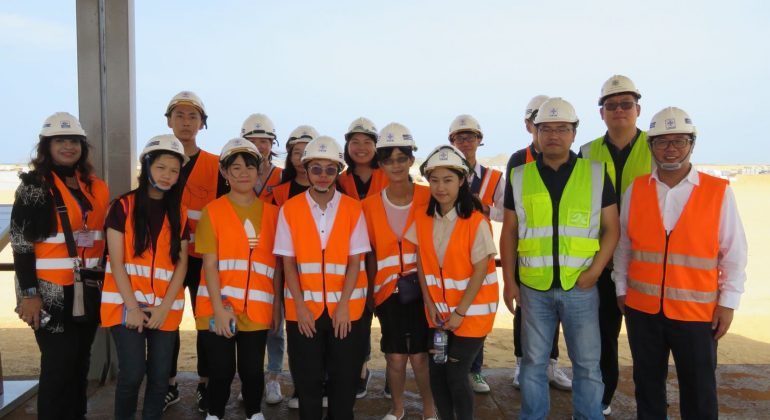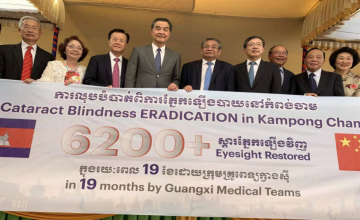 Hainan Free Trade Port Innovative Policies
Hainan Free Trade Port Innovative Policies
A short 6-day trip started off with some hesitation, to a gradual appreciation of the country, and ended with a reluctant departure. For the students, Sri Lanka was an experience they’ll never forget.
Lau Ngai Pok | Chan Ka Ki | Tang Wing Yu reporting from Sri Lanka!
Ms Yueng Yat Heung | Mr Cheng Kai Yin, coordinate
Day 5
First Stop: Chinese Cultural Centre

Today, we went to the Chinese Cultural Centre in Sri Lanka. We toured exhibitions that displayed China’s unique characteristics and the staff also filled us in on their development projects, promotional methods and activities in the country. The trip to the centre allowed me to understand Chinese culture’s profound impact on the world. Chinese culture, to some extent, has already become inseparable with the rest of the world. Currently, China has more than 30 overseas cultural centres. Although during the development process, the government encountered numerous obstacles, the centres ultimately were acknowledged by the local people. This trip has allowed me to become more aware of Chinese cultural inheritance and inspired me to study more about China so that one day I can pass my knowledge on to future generations and allow others around me to have a better understanding of Chinese culture.
Second Stop: Colombo, Sri Lanka
 The port city of Colombo is a major project for the China Harbour Engineering Company. The company is constructing an artificial island outside the original business centre of Colombo. In 25 years’ time, they hope this artificial island will become the new business centre of the country.
The port city of Colombo is a major project for the China Harbour Engineering Company. The company is constructing an artificial island outside the original business centre of Colombo. In 25 years’ time, they hope this artificial island will become the new business centre of the country.


Once we stepped foot on the artificial island, we were amazed by the progress made towards constructing the business centre. In one part of the island, we saw large heavy-duty machinery and vessels operating non-stop throughout the day. It is hard to imagine that the work China Harbour Engineering has accomplished so far only took around 900 days to complete. Such a feat!
We also really appreciate these Chinese workers who have left their hometowns to help develop Sri Lanka’s economy. They are not only achieving their goals, but also those of the Chinese government!

Third Stop: China Geo-Engineering Corporation
While listening to staff talk about the number of Chinese companies involved with other countries’ development projects, I felt a sense of pride for my country. One memorable moment during our visit was when the General Manager shared his work experience with us. He has worked at the Sri Lanka branch for more than 20 years. When he first arrived to Sri Lanka, he was embroiled in the country’s civil war. However, he took the chance and stayed in Sri Lanka for his country and the company. What an enduring spirit!
Fourth Stop: Tour around the city
Today we explored the city by looking at Sri Lanka’s clothes, food, housing and transportation. In terms of food, we observed that there are mostly restaurants or dessert shops along the streets. The restaurants mainly serve curry and dishes with rich flavours, both an indication of Sri Lankans’ taste in food.

In terms of clothing, Sri Lankans and Hong Kong people dress very differently. Men in Sri Lanka wear sarongs, the national garment, and the women wear saris. When they’re not wearing traditional garments, both men and women still dress more conservatively than people in Hong Kong.
When it comes to housing, there is a huge contrast between Sri Lanka and Hong Kong. While rent is cheaper compared to Hong Kong (around 700-900 HKD per person), the quality of housing facilities is much lower in Sri Lanka. Sri Lankans also have large families, which make living spaces very crowded. In addition, public transport is limited to buses, tuk-tuks and taxis in Sri Lanka. And even though Hong Kong’s housing units are small and rent is expensive, the city has a variety of transportation options and there is more support for businesses.

Taking part in activities around the city has allowed us to understand how different the food, clothes, housing and transportation is in Sri Lanka. Even though we were unfamiliar with the city and encountered many obstacles, the locals’ friendliness allowed us to pluck up the courage and ask for help. By the end of the day, we become more in awe with the country and were left with unforgettable memories.
Day 6
Today is our last day in Sri Lanka. We trudged out of the hotel, reluctant to leave this beautiful country.
 Since our flight was at night, our tour guide Linda decided to take us around some of the city’s famous attractions, such as the Independence Memorial Hall, Catholic Church, the Hindu Temple, Jami Ul-Alfar Mosque, and the local markets.
Since our flight was at night, our tour guide Linda decided to take us around some of the city’s famous attractions, such as the Independence Memorial Hall, Catholic Church, the Hindu Temple, Jami Ul-Alfar Mosque, and the local markets.

Because this is our first time entering a mosque, we did not realize women were not allowed inside. Thus, the female students had to stand at the entrance while the male students went into the mosque. Through this experience, we were able to witness gender differences in Sri Lankan society and realized that no society is perfect. However, people can strive for gender equality so that, in the future, everyone can have access to these wonders of the world.

 Can’t forget the delicious lunch we had before leaving Sri Lanka! Linda brought us to taste traditional Sri Lankan dishes, introducing each food to us one by one and personally explaining the ways to eat certain dishes. Turns out the method of using your hands to eat is different in India, Pakistan and Sri Lanka!
Can’t forget the delicious lunch we had before leaving Sri Lanka! Linda brought us to taste traditional Sri Lankan dishes, introducing each food to us one by one and personally explaining the ways to eat certain dishes. Turns out the method of using your hands to eat is different in India, Pakistan and Sri Lanka!

Another memorable moment during the trip was our visit to the local markets, as it allowed us to get a closer look at local peoples’ lifestyle. Although they do not have air conditioners and refrigerators, the locals do not have to worry about genetic variants or pesticides problem since most of the food is produced locally. Because not many people visit the markets, many locals were very curious and intrigued by our presence. This goes to show that Sri Lanka does not have a big tourism industry and locals are hardly affected by it.
“For any student, this is an opportunity to strive a higher goal.”~ Lau Ngai Pok
Our trip to Sri Lanka is sadly coming to an end. During the trip, I learned about China’s development projects in Sri Lanka and the Chinese culture initiatives. This trip also got me out of my comfort zone and gave me a chance to reflect on what I desire in life and my future aspirations with regards to my studies. Since China’s influence in the world is steadily growing, opportunities abroad in these countries can be an opportunity for us to spread our wings and fly.
Through this trip, I have gone from having little knowledge of Sri Lanka to now having an affinity with the locals and a greater understanding of the country. As I look out the window and take in the beautiful scenery, I suddenly realized how fast time has gone by. In the past, I had complained about the slow-paced nature of the country, yet now I am heading to the airport with a heavy heart.
I fell in love with the city’s carefree nature and the local’s unique lifestyle. Although Sri Lanka is not particularly developed, the under-developed aspect is unable to cover up the country’s greatness and distinct culture. The variety of religions also adds a splash of brilliant colour to society.
Before coming here, many people would assume Sri Lanka is a war-torn country with corrupt people, and an unsafe place to live. However, this is not the case: people are genuinely friendly and hospitable. Whether it be the driver, tour guide, university students or hotel staff, everyone always greeted us with big smiles and were very sincere. I would say the people are what make the place, and for Sri Lanka, the locals have eliminated my pre-conceived notions of the country.
We are almost at the airport. While we are reluctant to leave, there always comes a time when we have to say goodbye. From today onwards, I will work hard on my studies, hold onto these new opportunities presented to us by China’s initiatives abroad, and try to come back to Sri Lanka once more to visit places I still haven’t gone to or even venture further into the region.





